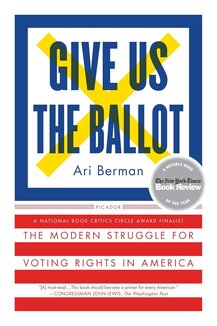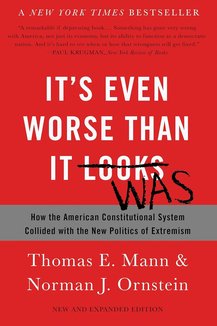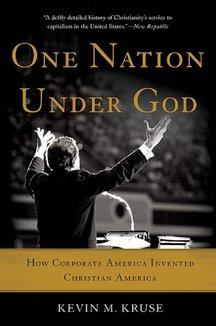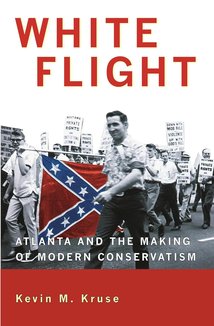Recommended Books

Give Us the Ballot: The Modern Struggle for Voting Rights in America
Author:
Ari Berman
ISBN 13:
978-1250094728
A National Book Critics Circle Award Finalist, Nonfiction Named a Notable Book of the Year by The New York Times Book Review and The Washington Post Named a Best Book of the Year by NPR, The Boston Globe, and Kirkus Reviews (Best Nonfiction) Countless books have been written about the civil rights movement, but far less attention has been paid to what happened after the dramatic passage of the Voting Rights Act in 1965 and the turbulent forces it unleashed. In this groundbreaking narrative history, Ari Berman charts both the transformation of American democracy under the VRA and the counterrevolution that has sought to limit it from the moment the act was signed into law. The VRA is widely regarded as the crowning achievement of the civil rights movement, and yet―more than fifty years later―the battles over race, representation, and political power continue, as lawmakers devise new strategies to keep minorities out of the voting booth, while the Supreme Court has declared a key part of the Voting Rights Act unconstitutional. Through meticulous research, in-depth interviews, and incisive on-the-ground reporting, Give Us the Ballot offers the first comprehensive history of its kind, and provides new insight into one of the most vital political and civil rights issues of our time.

It's Even Worse Than It Looks: How the American Constitutional System Collided with the New Politics of Extremism
Authors:
Thomas E. Mann
,
Norman J. Ornstein
ISBN 13:
978-0465096206
Acrimony and hyperpartisanship have seeped into every part of the political process. Congress is deadlocked and its approval ratings are at record lows. America's two main political parties have given up their traditions of compromise, endangering our very system of constitutional democracy. And one of these parties has taken on the role of insurgent outlier; the Republicans have become ideologically extreme, scornful of compromise, and ardently opposed to the established social and economic policy regime.In It's Even Worse Than It Looks , congressional scholars Thomas Mann and Norman Ornstein identify two overriding problems that have led Congress -- and the United States -- to the brink of institutional collapse. The first is the serious mismatch between our political parties, which have become as vehemently adversarial as parliamentary parties, and a governing system that, unlike a parliamentary democracy, makes it extremely difficult for majorities to act. Second, while both parties participate in tribal warfare, both sides are not equally culpable. The political system faces what the authors call &"asymmetric polarization," with the Republican Party implacably refusing to allow anything that might help the Democrats politically, no matter the cost.With dysfunction rooted in long-term political trends, a coarsened political culture and a new partisan media, the authors conclude that there is no &"silver bullet"; reform that can solve everything. But they offer a panoply of useful ideas and reforms, endorsing some solutions, like greater public participation and institutional restructuring of the House and Senate, while debunking others, like independent or third-party candidates. Above all, they call on the media as well as the public at large to focus on the true causes of dysfunction rather than just throwing the bums out every election cycle. Until voters learn to act strategically to reward problem solving and punish obstruction, American democracy will remain in serious danger.
Find on:
 Amazon
Amazon

One Nation Under God: How Corporate America Invented Christian America
Author:
Kevin M. Kruse
ISBN 13:
978-0465097418
The provocative and authoritative history of the origins of Christian America in the New Deal era We're often told that the United States is, was, and always has been a Christian nation. But in One Nation Under God , historian Kevin M. Kruse reveals that the belief that America is fundamentally and formally Christian originated in the 1930s. To fight the "slavery" of FDR's New Deal, businessmen enlisted religious activists in a campaign for "freedom under God" that culminated in the election of their ally Dwight Eisenhower in 1952. The new president revolutionized the role of religion in American politics. He inaugurated new traditions like the National Prayer Breakfast, as Congress added the phrase "under God" to the Pledge of Allegiance and made "In God We Trust" the country's first official motto. Church membership soon soared to an all-time high of 69 percent. Americans across the religious and political spectrum agreed that their country was "one nation under God." Provocative and authoritative, One Nation Under God reveals how an unholy alliance of money, religion, and politics created a false origin story that continues to define and divide American politics to this day.

White Flight: Atlanta and the Making of Modern Conservatism (Politics and Society in Modern America)
Author:
Kevin M. Kruse
ISBN 13:
978-0691133867
The forgotten story of how southern white supremacy and resistance to desegregation helped give birth to the modern conservative movement During the civil rights era, Atlanta thought of itself as "The City Too Busy to Hate," a rare place in the South where the races lived and thrived together. Over the course of the 1960s and 1970s, however, so many whites fled the city for the suburbs that Atlanta earned a new nickname: "The City Too Busy Moving to Hate." In this reappraisal of racial politics in modern America, Kevin Kruse explains the causes and consequences of "white flight" in Atlanta and elsewhere. Seeking to understand segregationists on their own terms, White Flight moves past simple stereotypes to explore the meaning of white resistance. In the end, Kruse finds that segregationist resistance, which failed to stop the civil rights movement, nevertheless managed to preserve the world of segregation and even perfect it in subtler and stronger forms. Challenging the conventional wisdom that white flight meant nothing more than a literal movement of whites to the suburbs, this book argues that it represented a more important transformation in the political ideology of those involved. In a provocative revision of postwar American history, Kruse demonstrates that traditional elements of modern conservatism, such as hostility to the federal government and faith in free enterprise, underwent important transformations during the postwar struggle over segregation. Likewise, white resistance gave birth to several new conservative causes, like the tax revolt, tuition vouchers, and privatization of public services. Tracing the journey of southern conservatives from white supremacy to white suburbia, Kruse locates the origins of modern American politics.